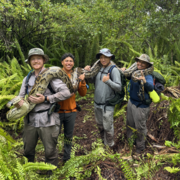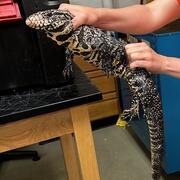Amanda M Kissel, PhD
Amanda Kissel is a Research Ecologist in the Invasive Species Science branch at the Fort Collins Science Center. Her work is primarily focused on invasive reptiles.
Amanda Kissel is a quantitative population ecologist with applied experience in amphibian and reptile conservation. Her focus is on developing population models and tools that managers can use to make informed decisions. She’s worked in a wide array of systems, ranging from montane environments in the Pacific Northwest and Rocky Mountains, vernal pools in the San Juaquin Valley of California, the Mojave Desert in the Southwestern US, and the Wider Caribbean region. Amanda has worked with a diverse array of partners, including the National Park Service, Bureau of Land Management, US Fish and Wildlife Service, non-profit organizations, and international government agencies, and finds that science works best when done in close collaboration with partners. Amanda’s current focus is on modeling population dynamics of invasive reptiles.
Professional Experience
Biologist, Fort Collins Science Center, USGS
Education and Certifications
PhD in Biology, Simon Fraser University, 2017
BSc in Wildlife Biology, Colorado State University, 2008
Science and Products
Invasive Burmese python research in the Greater Everglades
Early detection and rapid response tools for invasive tegu lizards
Developing and evaluating a point-of-use environmental DNA test for rapid field detection of highly invasive brown treesnakes
A citizen science program for brown treesnake removal and native species recovery at a National Historical Park in Guam
Biology, Impacts and Control of Invasive Reptiles in the Everglades
Ecology and Control of Invasive Reptiles in Florida
A Framework for Guiding Management Decisions for Amphibians in an Uncertain Future
Model outputs of habitat suitability for three invasive tegu lizards across the contiguous United States under current and future climate scenarios Model outputs of habitat suitability for three invasive tegu lizards across the contiguous United States under current and future climate scenarios
Morphometric data of Burmese python and White-tailed deer in South Florida associated with a feeding event, 2025 Morphometric data of Burmese python and White-tailed deer in South Florida associated with a feeding event, 2025
Current and future hydrology and occupancy predictions for boreal toads (Anaxyrus boreas boreas) in the Southern Rocky Mountains Current and future hydrology and occupancy predictions for boreal toads (Anaxyrus boreas boreas) in the Southern Rocky Mountains
Amphibian (chorus frog, wood frog, tiger salamander) surveys in Rocky Mountain National Park (1986-2022) Amphibian (chorus frog, wood frog, tiger salamander) surveys in Rocky Mountain National Park (1986-2022)
Post-hatching maternal attendance in wild Burmese Pythons in southern Florida Post-hatching maternal attendance in wild Burmese Pythons in southern Florida
Consumption of a non-native Walking Catfish (Clarias batrachus) by a Florida Green Watersnake (Nerodia floridana) in Everglades National Park Consumption of a non-native Walking Catfish (Clarias batrachus) by a Florida Green Watersnake (Nerodia floridana) in Everglades National Park
Cold-induced vomiting of a white-tailed deer (Odocoileus virginianus) by an invasive Burmese python (Python bivitattus) in Big Cypress National Preserve, Florida, USA Cold-induced vomiting of a white-tailed deer (Odocoileus virginianus) by an invasive Burmese python (Python bivitattus) in Big Cypress National Preserve, Florida, USA
Modeling current and future distribution of invasive tegu lizards along geopolitical boundaries in the contiguous United States: Implications for invasion threat Modeling current and future distribution of invasive tegu lizards along geopolitical boundaries in the contiguous United States: Implications for invasion threat
An Eastern Ribbonsnake, Thamnophis sauritus (Linnaeus, 1766), scavenging on a roadkilled Cuban Treefrog, Osteopilus septentrionalis, (Duméril & Bibron, 1841), in Everglades National Park, Florida, USA An Eastern Ribbonsnake, Thamnophis sauritus (Linnaeus, 1766), scavenging on a roadkilled Cuban Treefrog, Osteopilus septentrionalis, (Duméril & Bibron, 1841), in Everglades National Park, Florida, USA
Assessing the effects of climate and visitor use on amphibian occupancy in a protected landscape with long-term data Assessing the effects of climate and visitor use on amphibian occupancy in a protected landscape with long-term data
An early detection rapid response case study of the Black and White Tegu (Salvator merianae) and implications for a broader framework An early detection rapid response case study of the Black and White Tegu (Salvator merianae) and implications for a broader framework
Playing detective for invasive tegus in Everglades National Parki Playing detective for invasive tegus in Everglades National Parki
Flooding-induced failure of an invasive Burmese Python nest in southern Florida Flooding-induced failure of an invasive Burmese Python nest in southern Florida
Contrasting demographic responses under future climate for two populations of a montane amphibian Contrasting demographic responses under future climate for two populations of a montane amphibian
Biofluorescence in tiger salamanders documented in Rocky Mountain National Park for the first time Biofluorescence in tiger salamanders documented in Rocky Mountain National Park for the first time
Density dependence and adult survival drive the dynamics in two high elevation amphibian populations Density dependence and adult survival drive the dynamics in two high elevation amphibian populations
Non-USGS Publications**
**Disclaimer: The views expressed in Non-USGS publications are those of the author and do not represent the views of the USGS, Department of the Interior, or the U.S. Government.
A decision support tool for assessing current and future occupancy trends for boreal toads in the Southern Rocky Mountains A decision support tool for assessing current and future occupancy trends for boreal toads in the Southern Rocky Mountains
Science and Products
Invasive Burmese python research in the Greater Everglades
Early detection and rapid response tools for invasive tegu lizards
Developing and evaluating a point-of-use environmental DNA test for rapid field detection of highly invasive brown treesnakes
A citizen science program for brown treesnake removal and native species recovery at a National Historical Park in Guam
Biology, Impacts and Control of Invasive Reptiles in the Everglades
Ecology and Control of Invasive Reptiles in Florida
A Framework for Guiding Management Decisions for Amphibians in an Uncertain Future
Model outputs of habitat suitability for three invasive tegu lizards across the contiguous United States under current and future climate scenarios Model outputs of habitat suitability for three invasive tegu lizards across the contiguous United States under current and future climate scenarios
Morphometric data of Burmese python and White-tailed deer in South Florida associated with a feeding event, 2025 Morphometric data of Burmese python and White-tailed deer in South Florida associated with a feeding event, 2025
Current and future hydrology and occupancy predictions for boreal toads (Anaxyrus boreas boreas) in the Southern Rocky Mountains Current and future hydrology and occupancy predictions for boreal toads (Anaxyrus boreas boreas) in the Southern Rocky Mountains
Amphibian (chorus frog, wood frog, tiger salamander) surveys in Rocky Mountain National Park (1986-2022) Amphibian (chorus frog, wood frog, tiger salamander) surveys in Rocky Mountain National Park (1986-2022)
Post-hatching maternal attendance in wild Burmese Pythons in southern Florida Post-hatching maternal attendance in wild Burmese Pythons in southern Florida
Consumption of a non-native Walking Catfish (Clarias batrachus) by a Florida Green Watersnake (Nerodia floridana) in Everglades National Park Consumption of a non-native Walking Catfish (Clarias batrachus) by a Florida Green Watersnake (Nerodia floridana) in Everglades National Park
Cold-induced vomiting of a white-tailed deer (Odocoileus virginianus) by an invasive Burmese python (Python bivitattus) in Big Cypress National Preserve, Florida, USA Cold-induced vomiting of a white-tailed deer (Odocoileus virginianus) by an invasive Burmese python (Python bivitattus) in Big Cypress National Preserve, Florida, USA
Modeling current and future distribution of invasive tegu lizards along geopolitical boundaries in the contiguous United States: Implications for invasion threat Modeling current and future distribution of invasive tegu lizards along geopolitical boundaries in the contiguous United States: Implications for invasion threat
An Eastern Ribbonsnake, Thamnophis sauritus (Linnaeus, 1766), scavenging on a roadkilled Cuban Treefrog, Osteopilus septentrionalis, (Duméril & Bibron, 1841), in Everglades National Park, Florida, USA An Eastern Ribbonsnake, Thamnophis sauritus (Linnaeus, 1766), scavenging on a roadkilled Cuban Treefrog, Osteopilus septentrionalis, (Duméril & Bibron, 1841), in Everglades National Park, Florida, USA
Assessing the effects of climate and visitor use on amphibian occupancy in a protected landscape with long-term data Assessing the effects of climate and visitor use on amphibian occupancy in a protected landscape with long-term data
An early detection rapid response case study of the Black and White Tegu (Salvator merianae) and implications for a broader framework An early detection rapid response case study of the Black and White Tegu (Salvator merianae) and implications for a broader framework
Playing detective for invasive tegus in Everglades National Parki Playing detective for invasive tegus in Everglades National Parki
Flooding-induced failure of an invasive Burmese Python nest in southern Florida Flooding-induced failure of an invasive Burmese Python nest in southern Florida
Contrasting demographic responses under future climate for two populations of a montane amphibian Contrasting demographic responses under future climate for two populations of a montane amphibian
Biofluorescence in tiger salamanders documented in Rocky Mountain National Park for the first time Biofluorescence in tiger salamanders documented in Rocky Mountain National Park for the first time
Density dependence and adult survival drive the dynamics in two high elevation amphibian populations Density dependence and adult survival drive the dynamics in two high elevation amphibian populations
Non-USGS Publications**
**Disclaimer: The views expressed in Non-USGS publications are those of the author and do not represent the views of the USGS, Department of the Interior, or the U.S. Government.








